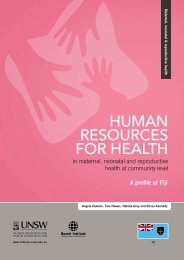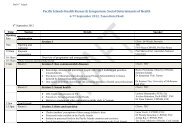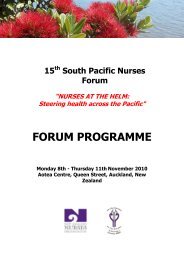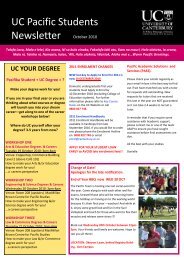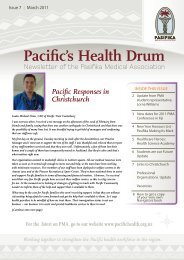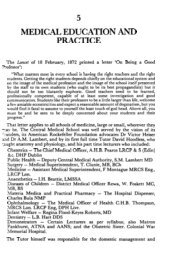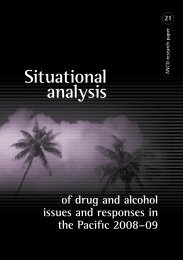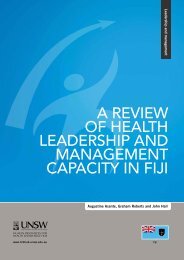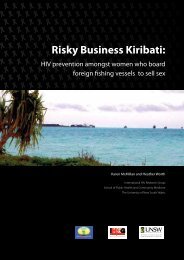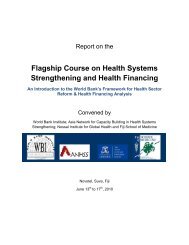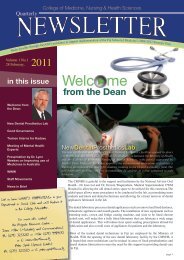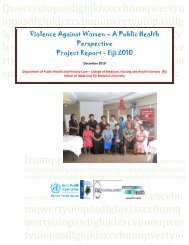rp21 situational analysis - Pacific Health Voices
rp21 situational analysis - Pacific Health Voices
rp21 situational analysis - Pacific Health Voices
You also want an ePaper? Increase the reach of your titles
YUMPU automatically turns print PDFs into web optimized ePapers that Google loves.
2.6 Australian involvement<br />
In the interests of aid harmonisation, the<br />
Australian Government has opted to provide<br />
aid to the Cook Islands by way of an annual<br />
contribution to management and implementation<br />
costs of the program managed<br />
by NZAID. During 2008–09 Australia’s total<br />
overseas development assistance to the Cook<br />
Islands is estimated to be AU$5.1 million,<br />
including bilateral (approx. AU$2.7 million)<br />
and other programs. 183 The Cook Islands is<br />
also a part of <strong>Pacific</strong> Regional Programs to<br />
which the Australian Government provides a<br />
significant contribution. 184 Notably, the Cook<br />
Islands participates in the <strong>Pacific</strong> Patrol Boat<br />
Program, including provision of a patrol boat<br />
in 1989 and a life extension upgrade for<br />
boats in 2006. 185<br />
Australian Agency for<br />
International Development<br />
AusAID’s contributions to the Cook Islands<br />
development program support health and governance<br />
activities. Details of the Joint Country<br />
Strategy are outlined below in section 2.7<br />
(International involvement) of the report.<br />
Australian non-government<br />
organisations<br />
No Australian NGO programs in the Cook<br />
Islands have been identified. 186<br />
2.7 International<br />
involvement<br />
New Zealand<br />
The Cook Islands Joint Country Strategy<br />
2008–2017 is a cooperation agreement between<br />
the Cook Islands Government, NZAID<br />
and AusAID. 187 The strategy reflects the Cook<br />
Islands NSDP. New Zealand and Australia<br />
have identified four focus areas including:<br />
investing in people; good governance; sustainable<br />
livelihoods; and economic growth<br />
and infrastructure. New Zealand is the<br />
main contributor to the strategy allocating<br />
NZ$9 million, with Australia contributing<br />
AU$2.6 million. 188<br />
The program funds visits by medical specialists<br />
and additional future support will be<br />
considered, potentially providing an opportunity<br />
to support the local development of<br />
drug and alcohol interventions. The strategy<br />
has also supported governance programs,<br />
including strengthening legislation and law<br />
enforcement around money laundering and<br />
public sector reforms. A plan to undertake<br />
an impact study on current community sector<br />
programs, funded under the Small Grants<br />
Scheme, may provide avenues for future<br />
investment in drug and alcohol services.<br />
43<br />
183 Australian Government Department of Foreign Affairs and Trade above, fn.18, compared to the<br />
Cook Islands Joint Country Strategy 2008–2017; figure is quoted as NZ$1.7 million.<br />
184 See section 1 of this report (Regional overview) for further detail on this program.<br />
185 Ibid.<br />
186 Australian Council for International Development: (accessed May<br />
2009).<br />
187 NZAID (2007), Cook Islands Joint Country Strategy (JCS) 2008–2017 Information Paper.<br />
Available at: .<br />
188 Subject to parliamentary approval.<br />
Cook Islands



